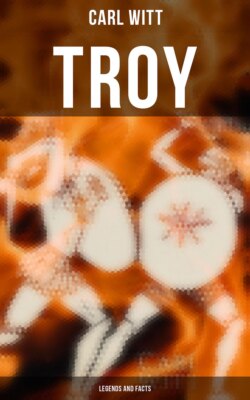Читать книгу TROY - Legends and Facts - Carl Witt - Страница 6
На сайте Литреса книга снята с продажи.
CHAPTER IV. AGAMEMNON AND ACHILLES.
ОглавлениеTable of Contents
Nine years had thus gone by, and the hopes of the Greeks were fixed upon the tenth year ; for it had been foretold by a divine token that the tenth year would witness the end of the war, and the destruction of the hated city. Whilst they were at Aulis they were assembled one day under a beautiful plane-tree close by a clear stream of running water. They had raised an altar of green turf, and were about to offer to the gods a hecatomb —that is, a great sacrifice of many animals. But at that moment, there came from under the altar a great dragon with bloody jaws, who glided up to the top of the tree, where there was a nest with eight young sparrows in it. The poor little birds screamed piteously, but the dragon swallowed them one after another, and ended by devouring the mother, who had kept flying round and round the nest, as if she could protect her young ones. When he had done this, the dragon remained motionless and the Greeks presently saw that he was turned to stone. Then they asked the priest Calchas what it meant, and he said, 'As the dragon has devoured the nine sparrows, so will you fight in vain for nine years, but in the tenth year the city will be yours.'
It was now the beginning of the tenth year, and just at this time there arose a grievous division among the Greeks themselves. King Agamemnon had, after one of the foraging expeditions, gained as his share of the booty a beautiful and gifted maiden named Chrisels, who had been captured and made a slave. Her father was a priest of Apollo in the town of Chrysa, and he came to the camp with a consecrated garland round his head and a golden wand in his hand, and demanded in the name of the god he served that his daughter should be restored to him ; he brought, moreover, rich treasures for her ransom. All the other chiefs said that the priest should be held in honour and allowed to take away his daughter, but Agamemnon dismissed the old man with rough words, and threatened to punish him severely if he ever again ventured to appear in his presence. Sorrowfully the priest returned to his home and prayed to Apollo to avenge him on the Greeks. The god heard, and soon a pestilence broke out in the camp, first among the mules and dogs, and then among the men themselves. One after another was laid low by the arrows of Apollo, and day after day arose the flames of the funeral piles on which the bodies of the dead were being burnt. At last Achilles summoned the chiefs together and desired the soothsayer Calchas to declare to them wherefore the god was wroth, and how he might be appeased. Calchas answered that he knew well the cause of the pestilence, but feared to declare it, unless Achilles would swear to protect him from the wrath of him whom he would make his enemy by what he had to say. Achilles swore that he would protect him, were it even from Agamemnon himself; and then Calchas proclaimed the reason of the pestilence, and said further that it would not cease until the priest's daughter had been restored to her home without ransom, and a hecatomb of a hundred victims had been offered up to the god. Agamemnon was much displeased, but he said that for the sake of the Greeks he would send back the slave to her father; yet must they give him another instead of her. To this Achilles replied that he must wait until the time when Troy should be overcome, and then he should receive three or four times the value of his present loss. But Agamemnon was already angered with Achilles for having promised his protection to the soothsayer, and he made answer that no other slave would content him but the maiden Brisels, who had fallen to the lot of Achilles himself, and that if Achilles refused to part with her peaceably, he would possess himself of her by force. Then more stormy words and offensive speeches were bandied about between the two chiefs, and at last Achilles said that he would not indeed fight with the king about a slave girl; but that since this was the gratitude he gained by coming to the help of the Greeks, he should withdraw himself from taking any further part in the war, and return home again with all his ships. But Agamemnon gave no heed to his words. Then Achilles rose, and dashing his princely staff upon the ground, cried out, 'As surely as this staff has borne neither twigs nor leaves since the day when it was cut from the tree, so surely will the time come when the Greeks shall sue in vain for my help, and when Agamemnon will bitterly repent that he has denied to the bravest of his heroes the honour due to him.'
Achilles kept his word. When Agamemnon afterwards sent two heralds to fetch Brisels, he allowed them to take her, notwithstanding her unwillingness to leave him. He withdrew himself, moreover, from the camp and from the council-chamber, hard though it was to him to feel that he had no longer any part or lot in the war.
The priest's daughter was sent back to Chrysa by Agamemnon without ransom, and with her a hecatomb, which the priest sacrificed on the altar of Apollo, praying that the god would cause the pestilence to cease. At the same time, a huge sacrifice was offered in the camp, and all the Greeks purified themselves and washed their bodies.
